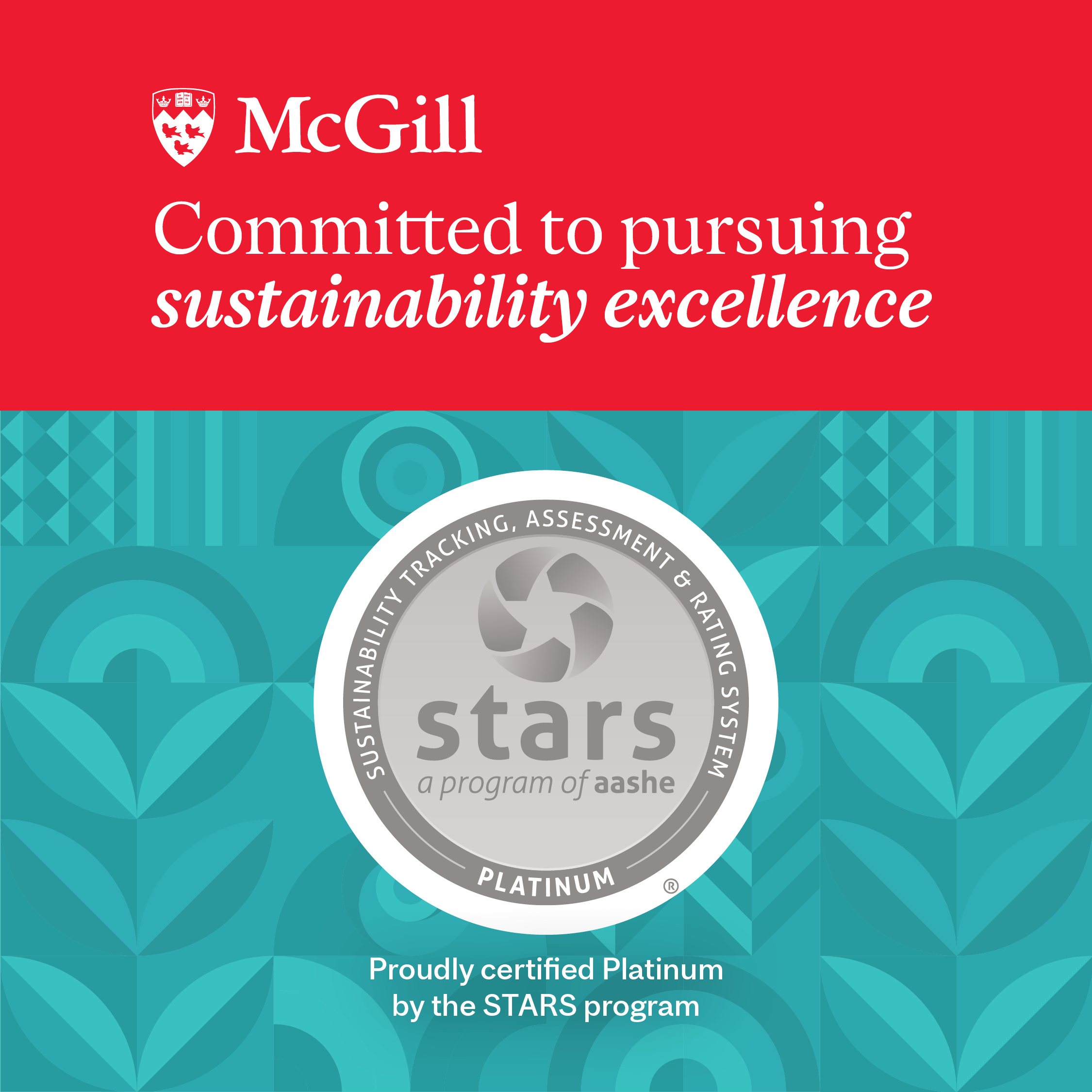
McGill has achieved a major sustainability milestone years ahead of schedule. Thanks in large part to the collective efforts of the University community, McGill received a Platinum STARS rating in recognition of its achievements in sustainability.
Platinum is the highest rating in the Sustainability, Tracking, Assessment and Rating System (STARS®), which is used to measure and report on sustainability performance in higher education. McGill now ranks among the very best in the world, with only 13 other institutions worldwide currently at this status. McGill is also the oldest Canadian university, in terms of infrastructure, to achieve a Platinum STARS rating.
“In 2017, McGill set an ambitious target, to reach Platinum by 2030. Achieving this six years early showcases the collective commitment of the McGill community in pursuing sustainability excellence,” says Diana Dutton, Interim Vice President of Administration and Finance.
Rigorous assessment by sustainability experts
 Administered by the Association for the Advancement of Sustainability in Higher Education, the Sustainability Tracking, Assessment, and Rating System is a transparent, self-reporting framework for colleges and universities to measure their sustainability performance. Due to the system’s broad scope and its peer review process, STARS is considered one of the most reliable means of measuring an institution’s track record on sustainability indicators.
Administered by the Association for the Advancement of Sustainability in Higher Education, the Sustainability Tracking, Assessment, and Rating System is a transparent, self-reporting framework for colleges and universities to measure their sustainability performance. Due to the system’s broad scope and its peer review process, STARS is considered one of the most reliable means of measuring an institution’s track record on sustainability indicators.
The rigorous ratings framework includes over 900 indicators and ensures credibility through assessment by an independent panel of sustainability experts. The ratings are based on a broad and inclusive concept of sustainability and structured in 17 impact areas ranging from curriculum, research, and campus engagement, to buildings, purchasing, and investment and finances.
Collective effort
Rated Gold by STARS for the past six years, McGill earned Platinum due to a collective effort to improve sustainability across its campuses. Several areas of progress, including these two, pushed McGill from gold to platinum:
- Buildings
McGill diligently pursues sustainability amidst aging infrastructure. Since 2016, the University has systematically integrated relevant LEED standards into its Design Standards, with all new construction or significant renovations now built to LEED Gold specifications, where eligible. In addition, McGill now diverts most of its construction waste away from landfill.
- Learning
The University has recently introduced several initiatives aimed at enhancing access to sustainability resources for its community. These include a new fellows program to support faculty in integrating sustainability into their courses, an elective on climate crisis and climate action and an introductory sustainability module that is available to all staff and students. The University has also incorporated expanded commitments to sustainability-focused teaching and learning into the McGill Sustainability Policy and Strategic Academic Plan, which will pave the way for new initiatives.
Working today to improve tomorrow
François Miller, Executive Director of Sustainability, says that, while the Platinum STARS rating is very good, McGill can’t rest on its laurels.
“Reaching the Platinum Sustainability Rating is a significant milestone that we are proud of, but it’s not the end of our journey” says Miller. “With the world facing serious climate and biodiversity challenges, universities like McGill will continue to play an important role in leading by example” he continues.
Redoubling efforts to improve while looking ahead are at the core of a number of McGill initiatives currently underway. Included among these is the New Vic project, which will be a state-of-the-art research, teaching, and learning hub dedicated to Sustainability Systems and Public Policy, and the installation of new electric boilers, expected to reduce the downtown campus’ energy-related emissions from buildings by 29 percent, in line with McGill’s commitment to reach carbon neutrality by 2040.
McGill is currently in a consultation process for its next Climate and Sustainability Strategy (2025 – 2030). Share your ideas for the future of sustainability at McGill via the virtual Community Vision Board.
